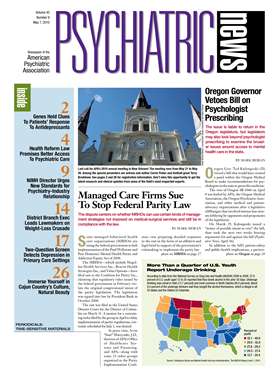Oregon Gov. Ted Kulongoski (D) vetoed a bill that would have created a panel within the Oregon Medical Board to make recommendations for psychologists in the state to prescribe medicine.
The veto of Oregon SB 1046 on April 8 was hailed by APA, the Oregon Medical Association, the Oregon Psychiatric Association, and other medical and patient-advocacy organizations after a legislative cliffhanger that involved intense last-minute lobbying by opponents and proponents of the legislation.
On March 29, Kulongoski issued a “notice of possible intent to veto” the bill, then took the next two weeks hearing arguments for and against the bill (Psychiatric News, April 16).
In addition to the bill's patient-safety and public-health implications, a particular concern of the governor's was the lack of public hearings on legislation that had been crafted during a short, special legislative session in February.
“I am concerned that SB 1046 as written creates serious policy and regulatory conflicts,” Kulongoski wrote in a letter to Oregon Secretary of State Kate Brown alerting her to the veto. “Furthermore, I believe that a policy change of this significance requires more safeguards, further study, and greater public input than was provided during the February special session.... I have a serious concern as to whether the Special Session in February provided opportunity for citizens and interested stakeholders to be adequately involved in the development of these proposed major policy changes.
“The public give-and-take is critical to crafting and amending legislation by allowing all interested parties to be involved in the development of public policy.”
John McCulley, executive director of the Oregon Psychiatric Association (OPA), said the governor had acted with courage in the face of enormous pressure from advocates for the bill.
Those advocates had touted the bill as a solution to problems with access to mental health care in the state. “On average there are less than four psychiatrists per 100,000 residents in rural parts of our country,” Oregon Sen. Monnes Anderson commented in remarks made on behalf of the bill in the legislature. “That means the majority of mental health patients are getting treated by nonpsychiatric physicians. We do not have enough psychiatrists, which has left it to primary care providers to do diagnosis and prescribing for mental health patients.”
In the letter announcing the veto, Kulongoski urged legislators to initiate in the next legislative session “a pilot program that would generate data on which to inform and guide solutions that give greater access to broader mental and physical health care.”
McCulley told Psychiatric News that the issue was very likely to surface again. He noted, for instance, that should a special legislative session be required this year to address the state's fiscal constraints, legislators could override the governor's veto with a two-thirds majority in both the House and the Senate.
McCulley said that OPA was “reasonably confident” that the veto would not be overriden in the event of a special legislative session—20 of the Oregon Senate's 30 members would need to vote for an override, and 11 had voted against the bill originally. Forty of the State House of Representative's 60 members would also need to approve an override.
If approved, Oregon SB 1046 would have established within the Oregon Medical Board the seven-member Committee on Prescribing Psychologists charged with making recommendations to the board on “educational requirements, clinical training requirements, standards, examinations, and continuing education for prescribing psychologists.” The committee would also have been charged with making recommendations to the board regarding the formulary for psychologist prescribing and annual formulary revisions.
A number of organizations—APA, the AMA, the Oregon Medical Association, and the Oregon Council of Child and Adolescent Psychiatry, among others—had weighed in against the bill. APA Medical Director James H. Scully Jr., M.D., in a letter to Kulongoski, said the bill “puts patients' lives at risk by creating a dangerous, substandard level of care.”
McCulley said a new version of psychologist prescribing—possibly involving a physician-assistant model in which physicians would have supervisory authority over prescribing psychologists—is liable to return in the next legislative session.
“Another possibility is to step back and take an overall look at access-to-service issues in the state,” he told Psychiatric News. “There is a need for more therapy services throughout the state, so it's an issue that's bigger than psychologist prescribing. So legislators may choose to look more broadly at what we could do to improve access to care.”
In the meantime, McCulley expressed gratitude to APA and other district branches for their support, as well as that of the AMA and other organizations. He also cited the support of individual pharmacists, nurse practitioners, and psychologists who opposed the prescribing bill.
“There was strong support for a veto from a broad spectrum of the health care and consumer communities” McCulley said. “From an organizational standpoint, it was gratifying to see the number of different people and organizations that supported us.”

